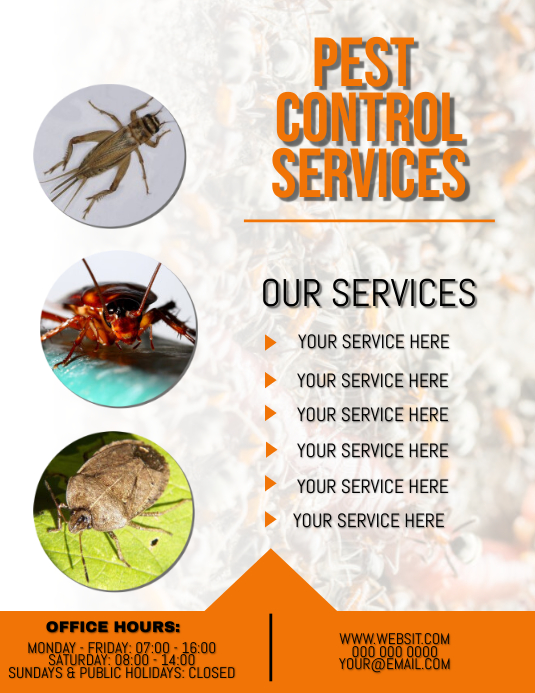Pest Control Auckland Professionals: Secure Your Home from Infestations
Wiki Article
Recognizing Different Kinds Of Parasite Control Methods and Their Efficiency
When considering insect control techniques, it is crucial to comprehend the diverse methods offered and their differing degrees of efficiency. By discovering the nuances of these pest control techniques, a thorough understanding of how to attend to parasite problems can be created.Chemical Insect Control Approaches
Chemical bug control methods play a critical role in successfully taking care of and eliminating pest invasions in various environments. These approaches involve the use of chemical substances to eliminate or deter insects such as insects, rodents, and weeds. One of the crucial advantages of chemical insect control is its ability to provide quick and targeted options to pest problems. By utilizing particular chemicals that are created to target particular pests, this approach can aid prevent damage to crops, structures, and human health.Nevertheless, it is crucial to take into consideration the possible risks and downsides linked with chemical pest control approaches. Overreliance on chemicals can bring about the growth of chemical resistance in pests, making them tougher to control in the lengthy run. In addition, making use of particular chemicals can have hazardous impacts on non-target organisms, the environment, and human health and wellness otherwise used appropriately.

Biological Pest Control Methods
Using all-natural predators and virus to manage insect populaces successfully, biological bug control methods provide a eco-friendly and sustainable technique to pest management. By presenting or promoting the activity of organisms that naturally take advantage of or infect pests, such as ladybugs for aphid control or particular microorganisms for caterpillar invasions, organic control can assist preserve bug populaces at workable levels without the requirement for synthetic chemicals. This method is specifically advantageous for natural farming practices, as it prevents using potentially unsafe substances while preserving crop wellness.
Physical Parasite Control Techniques
While biological insect control techniques concentrate on utilizing all-natural predators and virus, physical bug control techniques use physical and mechanical barriers to manage pest populaces. These techniques are typically taken into consideration eco-friendly as they decrease using chemicals. Physical parasite control consists of methods such as trapping, making use of obstacles like webs or screens, and literally getting rid of insects from the location.Catches are typically used in physical insect control to capture and remove insects like bugs and rodents. Another physical approach is the use of obstacles such as fences, screens, or internet to avoid pests from entering or infesting certain areas.
All-natural Bug Control Techniques
Including plant-based repellents and natural predators is a vital method in carrying out efficient natural bug control methods. By urging the presence of advantageous bugs like ladybugs, lacewings, or predacious termites, garden enthusiasts can normally control pest populations. These killers feed upon common garden bugs such as termites, caterpillars, and aphids, aiding to keep a well balanced ecosystem without the requirement for chemical treatments.
In addition, applying cultural techniques such as plant rotation, companion planting, and keeping correct plant health can additionally boost the effectiveness of all-natural bug control methods. These methods not just assist in preventing parasite invasions yet also advertise biodiversity and general community strength. By incorporating these all-natural strategies, people can effectively take care of pests while reducing ecological influence.
Integrated Bug Management (IPM) Method
Applying an Integrated Pest Monitoring (IPM) strategy is crucial for properly managing parasite populations while lessening dependence on chemical pesticides. IPM is a extensive and sustainable approach that integrates numerous parasite control approaches to attain long-term remedies. This strategy concentrates on tracking, avoidance, and control to attend to bug problems in an eco-friendly way.IPM incorporates biological, social, physical, and mechanical methods with the strategic and limited use of chemicals when necessary. By emphasizing proactive actions such as environment modification, organic control, and exemption, IPM intends to minimize pest populaces and their effect on the ecosystem. Regular surveillance is essential in IPM to evaluate pest levels precisely and figure out the most suitable control techniques.
Among the crucial benefits of IPM is its capacity to lessen the threats connected with too much pesticide usage, such as ecological contamination and harm to non-target organisms. Furthermore, IPM promotes a much more all natural technique to pest management by thinking about the general environment characteristics. In general, the IPM strategy uses a sustainable and efficient service for my blog pest control while promoting environmental duty.
Final Thought
To conclude, understanding the various kinds of pest control techniques and their performance is crucial in properly managing insect pop over to this web-site problems. Chemical, biological, physical, and natural bug control approaches each have their own advantages and restrictions. Integrated Parasite Management (IPM) strategy, which incorporates different techniques for lasting pest control, is progressively being identified as a ecologically friendly and all natural option. By making use of a combination of these approaches, people and companies can effectively control insects while minimizing injury to the atmosphere.Chemical pest control approaches play an essential function in successfully taking care of and removing pest infestations in different atmospheres.Utilizing all-natural killers and pathogens to handle parasite populaces effectively, organic pest control approaches supply a eco-friendly and lasting approach to pest monitoring. By promoting the task or introducing of organisms that normally prey on or contaminate bugs, such as ladybugs for aphid control or specific microorganisms for caterpillar problems, biological control can aid maintain parasite populaces at convenient degrees without the requirement for synthetic chemicals.While organic pest control techniques focus on utilizing natural predators and virus, physical pest control techniques make use of physical and mechanical barriers to take care of pest populations. Integrated Pest Management (IPM) important link method, which combines numerous methods for lasting bug control, is progressively being acknowledged as a holistic and environmentally pleasant remedy.
Report this wiki page